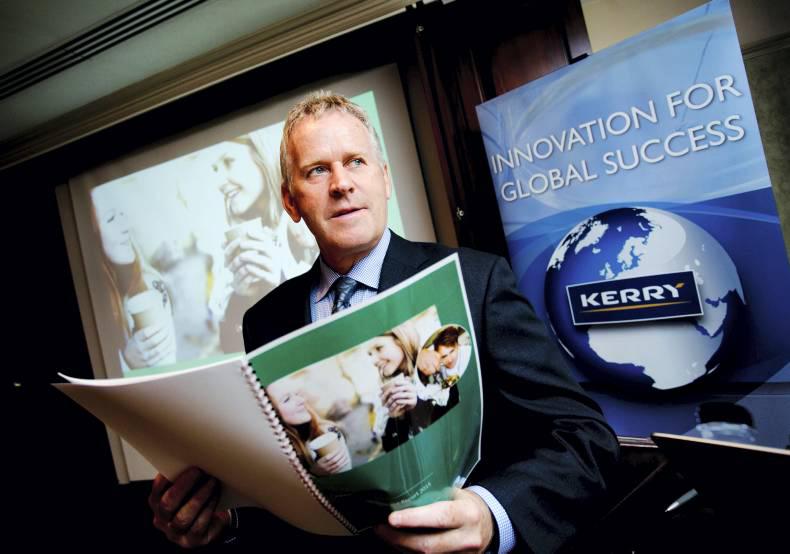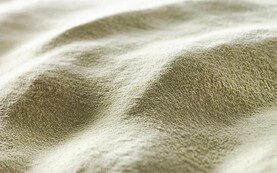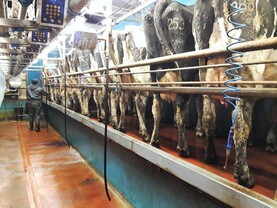Trading profit at food and ingredients group Kerry increased 9% to €300m for the first half of 2015. While recording strong growth in overall trading profit for the period, the consumer foods business saw trading profits fall by 3.9% due to business disposals following the sale of its pastry manufacturing assets last year and the management buyout of the direct-to-store business in the UK.
Group trading margins increased 40 basis points (bps) to 9.9%, driven by an improved product mix, operational efficiencies and the positive impact of exiting its non-core UK direct-to-store business.
Revenue increased 4.7% to €3.03bn, driven by an 8.4% positive currency tailwind. While business volumes were up 2.7%, pricing was back 2.7% as a result of lower raw material costs. Overall, the business saw strong volume growth (3.3%) in American markets, along with improved performance in Europe, Middle East and Africa (EMEA) with a modest 0.7% year-on-year volume growth.
Commodity (mostly dairy) deflation was most weighted to this region, and was back 3.8% in the first half of the year.
Following recent doubts over Chinese economic growth numbers, Kerry seems to be still performing strongly in the region. Chief executive Stan McCarthy believes in the region and is confident in its growth. Although Kerry volume growth was back in the the Asia-Pacific region on previous years, it still grew 7.2% year on year.
The group also attributed the strong trading performance across all regions to its improved product mix and restructuring of its consumer foods division.
Commenting on the results, McCarthy said: “We delivered a strong financial performance in the first half of 2015 and based on year-to-date performance, current exchange rates and business momentum, we are increasing our market guidance for the full year.”
He said that dairy prices are heading for serious territory and that today markets are not reflected in Irish milk prices on farm. He said that it will take shrinking global production, a lift of the Russian sanction and an increase in demand from China to turn markets.
He doesn’t see the continuous low price of oil helping the situation as oil-producing nations are generally dairy importers and low oil will not be good for their local economy and hence would affect dairy demand.
Adjusted earnings per share increased by 8.1% to 124.5c and the interim dividend per share increased by 11.1% to 15 cent. Based on year-to-date performance, current exchange rates and business momentum, Kerry has increased its growth outlook from 5-8% in adjusted earnings per share and now expects to achieve 6% to 9%. This would mean an adjusted EPS in the range of 296 to 304 cent per share in 2015.
Net debt at the period end was €1,277m, an increase of €82m relative to December 2014.
Ingredients and flavours
The ingredients and flavours revenue grew 8.6% to record revenues of €2.3bn. While volumes grew 3%, pricing was 2.8% lower, meaning positive currency translations contributed significantly to the improved revenue performance.
Trading profit increased 12.3% to €281m, leading to a margin growth of 40 bps to 12.1%.
Sales volumes grew 3.3% in the Americas region, challenged by some inflationary pressures in Brazil. The meat sector delivered solid performance in the US. In June, Kerry acquired KFI Savory, a US-based savoury flavour business from Kraft Foods.
Business volumes increased 7.2% in Asia despite lower levels of economic growth in the region. In EMEA, volumes grew marginally (0.7%).
Consumer foods
This division has undergone a significant amount of rationalisation in recent years, which is reflected in a robust underlying volume and margin performance. Revenues in consumer foods fell 6.4% to €749m as a result of business disposals.
Despite the sell-off of non-core businesses, overall business volumes increased by 1.9%, which is promising for a sector that has been struggling in recent times due to a changing consumer environment. The group said it saw good growth in chilled meals and a recovery in frozen.
In the UK it saw a decline in the dairy sector due to private-label spreads losing market share to heavily promoted butter offerings. In Ireland, branded dairy spread volumes were also lower. However, the Charleville brand of cheese gained strong growth.
Prices overall were back 2.6% due to the fact that the market remains highly competitive. Trading profits fell 3.9% to €60m, but margins increased by 20bps to 8%.
Acquisitions trail
Kerry has been very active this year, having spent €250m acquiring businesses since the start of the year and, according to McCarthy, there are plans to spend a further €250m before year end.
Some of the businesses it has acquired this year include Insight Beverages, a custom flavoured beverage business, in May. It also acquired KFI Savory from Kraft Foods in June. This business will significantly strengthen the group’s meat flavourings portfolio. In January, it acquired Rollover, which was interesting in that it is a hot-to-go offering that takes Kerry into the hospitality sector for the first time.
It is also in the process of closing deals to acquire Baltimore Spices, a meat flavourings and seasoning business, and PST, a Turkish branded foodservice provider to the bakery and confectionary sectors.
Kerry also recently formed a joint venture with IOI Loders Corklaan, a downstream processing division of IOI Group, one of the world’s largest vertically integrated palm oil producers. This JV will develop and market an infant nutrition ingredient.
No doubt some of these deals were funded by the sale of its Australian bakery ingredients business, Pinnacle, and the sale of the direct-to-store business in the UK for a total consideration of €151.3m before disposal-related costs.
Overall, the trading profit growth of 9% is positive as it was delivered on the back of a 4.7% increase in reported revenues and a 40bps lift in margin. Kerry is undoubtedly unrivalled in the breadth of its technology innovation and science capabilities. It has continued to position itself as a taste and nutrition business. It now has the architecture to transfer businesses that it acquires in one geography and move the technology to other geographies.
It has significantly restructured its consumer foods division and divested non-core businesses. However, it is likely price deflation will remain a key feature for the remainder of this year given the backdrop of around 6% lower raw material costs.
Kerry Co-op holds a 14% shareholding in Kerry. At a total market capitalisation of €12.5bn, this values the co-op’s share at close to €2bn. On Tuesday, shares closed at €70.34, 2.16 % below its all-time record high of €71.89, set on 7 August. Shares have increased 29% over the past 12 months alone.
Last month, the world’s largest asset manager, Blackrock, invested €120m buying 2m shares in the Tralee-headquartered group. This increases its stake by over a third and it now owns 4% of Kerry.






 This is a subscriber-only article
This is a subscriber-only article










SHARING OPTIONS: